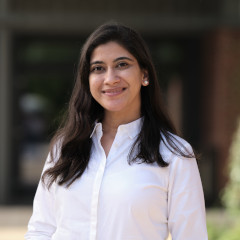Prenika Anand, PhD Candidate, Institute of Safe Autonomy, University of York
Prenika is a graduate dentist and holds a Masters in Health Administration from the Tata Institute of Social Sciences, Mumbai, and an MSc in Applied Digital Health from the University of Oxford.

For over a decade, Prenika co-designed and implemented digital health ecosystems for behaviour change, within an innovation-focused private health insurance setting.
Following her Oxford thesis on the role of technologies in loneliness, she was awarded a research fellowship by the Samuel Centre for Social Connectedness, where she explored the measurement of social connectedness as an indicator of wellbeing for the Oxford Poverty and Human Development Initiaitive.
She is currently a UKRI SAINTS CDT-funded PhD researcher in the Safety of Artificial Intelligence at York.
Email: prenika.anand@york.ac.uk
Our 60-second interview with Prenika:
Could you please tell us what work you do in the field of mental health?
My doctoral research explores the psychological harms of AI and psychological safety in human-AI interaction, and its particular implications for assisted living technologies for older adults.
What do you find most rewarding and inspiring in this work?
Having early translational experience in digital health has helped me realise the challenges of technology adoption, particularly their unintended consequences.
Investigating the psychological harms of AI offers a meaningful opportunity to advance ethically-grounded, human-centred approaches that safeguard mental wellbeing in an increasingly digital society.
What is the most challenging or complicated aspect of this work?
As AI systems increasingly permeate digital life, and more recently within care settings where workforce is limited, there is a critical need for intentional research and proactive safeguards. Unlike physical harm, psychological harm can be subtle, cumulative, and may manifest through emotional manipulation, reinforcement of harmful biases, or cognitive overload. Addressing these risks is essential to ensure psychologically safe technologies for healthy ageing, particularly in the context of shifting global demographics.
What impact do you hope your work is having - or can potentially have?
This research can advance our understanding of the critical issue of psychological safety in the life cycle of AI-led assisted living technologies, which are being built and deployed as semi-autonomous systems in homes for older people and many other vulnerable population groups.
Could you share with us one piece of advice that you follow for your own mental health?
I deeply value the power of habit in mind-body integration, particularly small, consistent actions, as emphasized by James Clear in Atomic Habits. For me, having a routine with everyday habits around movement, nutrition and social connection have been helpful. As a Buddhist, I’ve come to deeply value the role of mindfulness and meditation in everyday life—they’re not just practices but also carry evidence for psychological wellbeing.
